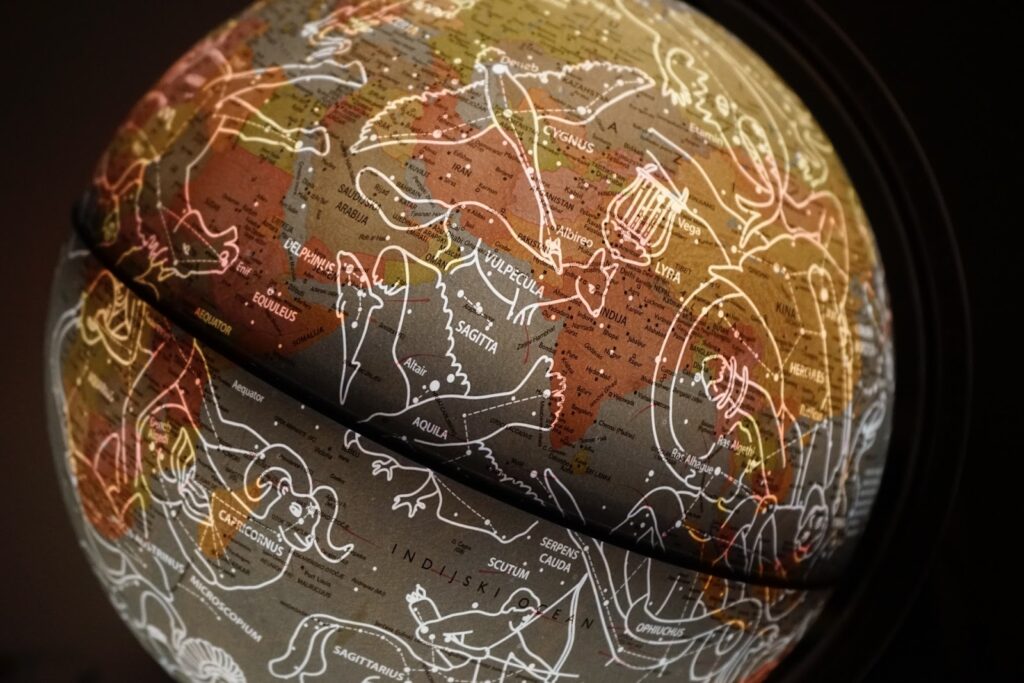The two fields of study Astrology and Astronomy have had humans casting their eyes to the skies for hundreds if not thousands of years, but what exactly is the difference between them? In this article we are going to take a closer look at these two fields to try and answer the question: what is the difference between Astrology and Astronomy?
What Is Astrology?
Astrology is considered a pseudoscientific range of divinatory practices which has been in existence since the 18th century. The theory behind which suggests that human affairs and terrestrial events can be predicted based on the apparent positions of celestial objects.

This is not a new concept however as different cultures throughout history since at least the 2nd century BC have employed versions of astrological study and interpretation. The positions of the stars in our night skies have been in some way significant to almost all of our planet’s cultures in some way.
History of Astrology
Ancient World
As early as 25,000 years ago carvings on bone and on cave walls show evidence of attempts to measure and predict seasonal changes using astronomical cycles. The Moon appears to have been a specific source for early seasonal understandings and these primitive inquisitions laid the path for the later grasp of its effect on the tides.
Early farmers began to address agricultural needs and milestones using knowledge of the constellations which appear more prominently in certain seasons. Their understanding of why certain star clusters were visible in certain seasons was limited but they grasped the correlation and used this knowledge accordingly.
Early Texts and Cultures
Cultures from India, China and even South America have attached importance to astronomical events. Elaborate systems have been developed independently around the world which were used for predicting terrestrial events based on observations of the stars.

Some of the earliest forms of astrology date back to 1,800 BC in Mesopotamia during the Old Babylonian period. In fact the earliest known texts regarding astrology date back to 1,700 BC and were compiled in Babylon. Early Hindu texts dating back to 1,400 BC discuss both astronomy but also astrology while evidence of these beliefs appear in China during the Zhou dynasty (1046 – 256 BC).
Ancient World Skeptics
Not all historical cultures fully embraced astrology in fact the Hellenistic schools of philosophical skepticism heaped criticism on the rationality of astrology. Academic skeptics such as Cicero, Carneades, Favorinus; and Sextus Empiricus have left records of criticism of the study.
Their criticism was not based on the connection between seasonal changes but the later beliefs that the stars contained the story of our fate. Cicero for example posited that twins who are by design born close together can have very different fates so how could the stars tell the tale of both?
Throughout time many have criticized astrology’s claims to be able to predict the path of fates yet it has still persisted in many forms for thousands of years. Today it exists as a pseudoscience meaning that it claims to be both scientific and factual but the results obtained are not compatible with the official scientific method.
It may show some level of accuracy but in such limited regard as to be unprovable by scientific means. You for example may read your horoscope and be told you will meet a dark stranger based on your star sign. Psychologically you may carry that and you may indeed meet a stranger with dark hair that day while millions who share your star sign may well not.
What Is Astronomy?
Astronomy is considered a science which deals in the study of celestial objects and phenomena. It uses a combination of chemistry, mathematics and physics to try and explain and understand the mysteries of the universe.

The study of Astronomy includes taking note of planets, moons, stars, nebulae, galaxies, meteoroid, asteroid, and comets. In the study of these things astronomers learn about astronomical events such as:
- supernova explosions
- gamma ray bursts
- quasars
- blazars
- pulsars,
- cosmic microwave background radiation.
In the most basic terms astronomy is the study and scientific quest for understanding of any and all objects outside of Earth’s atmosphere. It is one of the oldest natural sciences and something humans have been studying for thousands of years.
History of Astronomy
The earliest uses of astronomy technically gel with the earliest uses of astrology. In the attempts to understand what is happening in the visible parts of the universe that we could see from earth humans discovered cyclical patterns.
Positioning of stars, the Moon and the sun have historically been used in the building of religious shrines and places of worship showing signs of the understanding of these distant unknown celestial bodies. Throughout much of history if it could not be seen with the naked eye then humans were not aware of it.
Astronomers throughout history have made studies of what they can see, taken measurements and created theories regarding their observations some of which have been borne out as new technologies allowed for closer inspection of the objects.

Famous scientists such as Sir Issiac Newton formulated mathematical equations that have shown the movement of the planets around the sun while earlier academics faced charges of heresy for suggesting anything other than Earth being the center of the solar system.
What Is the Difference Between Astrology and Astronomy?
Both of these sciences relate to the celestial bodies that sit beyond Earth’s atmosphere and even come from the same roots and beliefs. However today astrology is considered a pseudoscience essentially meaning it claims scientific method but can not stand up to scientific standards.
Astronomy on the other hand does not claim that celestial bodies can affect the fate of humans on earth. It accepts however that proof exists of physical influences that bodies such as the sun and the moon indeed have on the planet.
As a science astronomy is very complicated but has been studied in great detail and we are making constant discoveries at a rapid pace. In comparison astrology does not seek to understand the stars but instead interpret fate based on their perceived positioning in the skies.
Final Thoughts
Astrology and Astronomy share common roots but one splintered off to become a science while the other remained rooted in beliefs and interpretations of fate. Astronomy seeks the answers to the way the universe works and how it was formed while astrology seeks to read fate based on the cycles of the stars in the sky and the orbits of the planets.
